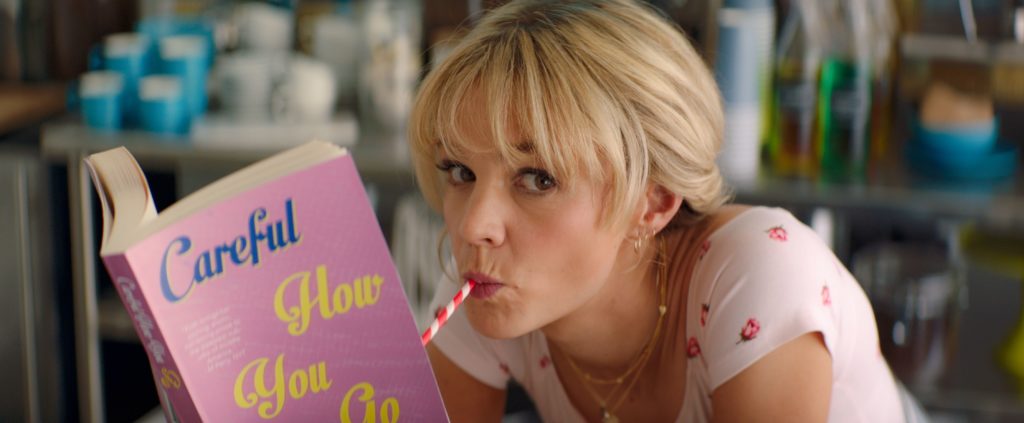New Movie Releases: April 2021
With the start of the new season we're excited for all of the April new movie releases, some of which our writers here will cover in individual reviews throughout the month.
Incluvie Foundation Gala - Learn More
This review will contain MAJOR spoilers. Content is highly triggering. TW/CW for rape, drug usage, sexual harrassment, death. You can view full movie warnings here.
“I said, ‘what are you doing?’”
The delivery of this line during one of the first scenes of the film immediately set the overarching tone for this thriller/dark comedy. However, for women- and probably men, too- there wasn’t much to laugh about in director Emerald Fennell’s Promising Young Woman, the unique adaptation a commentary on rape culture and the #metoo movement. For women, many lines in this film are the same rhetoric we’ve grown accustomed to hearing from men our whole lives; for men, the only slightly exaggerated conversations and mentality of the several awful men in the movie might potentially be a wake-up call. The (at times) kitschy dialogue does its job, immediately, very intentionally, playing upon womens’ discomfort, fear, and anger to put them in the main character’s frame of mind. Does this movie make you uncomfortable? Good. It was supposed to.

The opening scene- a group of men in a bar creeping on what appears to be an obscenely drunk woman- catapults you right into the beginning of what’s about to be 1 hour and 53 minutes of men being terrible and, like in most real cases, getting nowhere close to what they deserve for it. Cassie (Carey Mulligan) is a med school dropout pushing 30 years old who still lives at home with her parents. She works at a coffee shop owned by Gail (Laverne Cox) by day and by night, she dresses up and goes out on the town with a singular intention: to attract handsy men with a drunken act, then make them regret having ever picked her up in the first place. Cassie allows the men she goes home with to believe they’re taking advantage of her insobriety, and when they’re at their most vulnerable she flips the script, revealing herself to be both sober and in search of revenge.
Cassie has a good reason for being so angry- her best friend, Nina, was raped by a classmate, and she goes on to take her own life when her story is dismissed and disbelieved by their peers. While Nina’s story alone is tragic enough, the tragedy continues with Cassie’s inability to move on, resulting in an unhealthy and incredibly dangerous lifestyle that would ultimately never heal her pain.

Though Cassie’s main targets are the type of men to pick up and take advantage of an intoxicated woman, she doesn’t stop there. The movie aims to prove to the audience that silence is compliance, and those who knew about the assault and did/said nothing are just as guilty as those who participated. We’re introduced to the defense lawyer for Al Monroe, who begs Cassie for her forgiveness for a case he tearfully claims still haunts him. Cassie, in a rare break in her character’s resolve, cries with him and forgives him. We also meet Madison (Alison Brie), who is an ex-friend of Cassie and Nina’s who refused to believe Nina’s story; the audience is forced to uncomfortably witness Cassie intentionally intoxicate Madison to make her believe she was taken advantage of, as a form of payback for her dismissal of Nina’s assault claims. Perhaps equally distressing is Cassie’s payback for her old school’s dean, Elizabeth Walker (Connie Britton), which is having her daughter picked up by strange men and taken to an undisclosed location. (Spoiler: Madison was not assaulted, and Dean Walker’s daughter was not harmed, as Cassie’s only intention was to scare Madison and Elizabeth into understanding her perspective.)
Things seem like they may turn around for Cassie when she runs into an old classmate in her coffee shop, Ryan (Bo Burnham), who admits to still carrying a flame for her and insists on taking her out on a date. Cassie’s initial reluctance to go out with him is another unfortunate side effect of the trauma she experienced and a reminder of her distrust of men, so it’s especially heartwarming to see her go out on nerdy lame dates and have the time of her life with someone who appears to be a genuinely decent guy. The pleasant surprise of seeing Cassie so easily be herself and have a good time was only slightly masked by my personal astonishment over how many words I remember from Paris Hilton’s 2006 hit (somehow?) “Stars Are Blind”.

But appearances can certainly be deceiving…and as Cassie is all-too-aware, men are often disappointing. Just as Cassie seems to be on a better path for herself, finally trying to grow past her trauma and find her own happiness, Madison unearths a phone she owned in school, containing videographic evidence of Nina’s sexual assault. Even worse, a voice can be heard on the video calling for Ryan, revealing that he not only explicitly knew about Nina’s rape and is friends with her rapist, Al Monroe (Chris Lowell), but he witnessed the act and did nothing.
Cassie blackmails Ryan to find out where Al’s upcoming bachelor party will be, and she shows up dressed as a stripper, complete with a nurse’s costume, medical bag, and wild rainbow wig. She confronts Al privately after she has him handcuffed to the bed, delivering a speech about Nina’s originality and personality that will probably never fail to give me chills, no matter how many times I hear it.
“…I was just in awe of her. I couldn’t believe she wanted to be my friend. She didn’t give a f*** what anyone thought apart from me, because she was just… Nina. And then she wasn’t. Suddenly she was something else. She was yours. It wasn’t her name she heard when she was walking around. It was yours. Your name all around her. All over her, all of the time. And it just… squeezed her out. So when I heard your name again, your filthy f***ing name, I wondered, when was the last time anyone had said hers? Or thought it even, apart from me? And it made me so sad because, Al… YOU should be the one with her name all over you.”
-Cassie’s final speech to Al Monroe

Mulligan’s delivery was a perfect mixture of adoration, anger, hurt, and disgust, a heartfelt homage to her exceptional best friend and laced with all the vitriol of a woman who has had more than enough of horrific men. Cassie- with the intention of carving Nina’s name into Al’s skin- brandishes a scalpel from her medical bag and advances on him, but he’s able to slip free of one of the handcuffs in enough time to fight back. What follows is a nearly 2 and a half minute scene of the struggle, where Al ultimately smothers Cassie to death with a pillow. The harrowing scene is starkly quiet with only the occasional sounds of Cassie’s screams or struggle with the bedding and Al’s grunts, and rounds out with Al silently spending the entire night in the room with Cassie’s body, too in shock and disbelief to call for help. He’s found the next morning by his best friend Joe (Max Greenfield), who helps him come up with a plan to burn Cassie’s body.

It’s hard to describe the sickening feeling that follows, where it appears due to Cassie’s hobby and Al’s cover-up, Al is going to get away with all of it. Even more disturbing for me, as an avid true crime fan, was the realization that had Al not panicked and burned Cassie’s body, he would have been able to claim self-defense for her attack and continued living his life as he wished, likely free from any form of responsibility or incarceration.
But Cassie is nothing if not a promising young woman, and her death sets a plan in motion. She’d left an explanation for her disappearance with Al’s remorseful old defense lawyer, Jordan Green (Alfred Molina), who knows exactly where to send the police to arrest Al. Ryan receives a text at the wedding that the movie leaves us with, which reads: “You didn’t think this was the end, did you? It is now. Enjoy the wedding! Love, Cassie and Nina.” (Complete with a winking emoji, which is just *chef’s kiss*).
On the one hand, Promising Young Woman is everything one might want in a revenge flick, especially one that resonates with such a large subset of people due to the poison of rape culture still horrifically prevalent in today’s society. On the other, Fennell explores the often unfair and deeply unfortunate side effects of revenge, the consequences of complicit silence, and ultimately the potential repercussions of a life driven by revenge. In addition to the cast already mentioned, the film also saw Adam Brody, Jennifer Coolidge, Christopher Mintz-Plasse, and Molly Shannon in small roles, indicating to me that this was a project many people were excited to support.
Does it beat you over the head a little in its explanation? Sure. There’s absolutely nothing subtle about Fennell’s female-led film; and yet, by the end, it’s unclear what kind of message the audience is meant to take away from it. Is it a cautionary tale for sexually aggressive men, or a sobering warning for women seeking vengeance? After all, Cassie ultimately had to die to get the vengeance Nina deserved, mirroring the lengths women often have to go through to be believed in assault situations. I do admire the way Fennell turns the “dead stripper” trope on its head, instead giving the audience the opportunity to view an over-told story through the eyes of the victim rather than allowing the victim to become a faceless, nameless character that only serves to further the plot. Ultimately, however, the intention of the film fell flat for me, missing a lot of cues that I think could have made this feel more like a dark comedy instead of a stilted thriller.
For all its misses, Carey Mulligan shines as Cassie, a deeply complex character that many would’ve struggled to understand, much less accurately perform. Fennell and Mulligan clearly had a joint vision when creating this world and character, and the meshing between Fennell’s direction and Mulligan’s performance is nearly flawless. Bo Burnham gives a fantastic performance as Ryan, and I was delighted by Laverne Cox, as always. Through the lens of diversity and inclusion, the film is female-written, directed, and led, centering around a feminist story and movement, though outside of Cox, the cast is largely white.
I give Promising Young Woman an Incluvie score of 4 stars, and an overall movie score of 2.5 stars. The film is available for purchase on Amazon Prime.
Related lists created by the same author
With the start of the new season we're excited for all of the April new movie releases, some of which our writers here will cover in individual reviews throughout the month.
Related movie/TV/List/Topic
It is as bad as your remember, and you are fortunate if you've never watched it. Keep it that way!